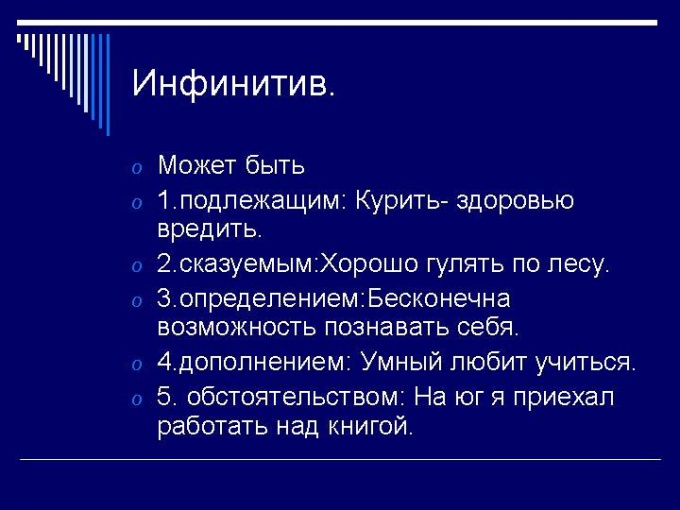The infinitive or indefinite form of the verb
The verb in initial or undefined, the form is called the infinitive. The infinitive always answers the question "what to do?" or "what to do?" Never applied to the initial form of the verb to ask questions: "what does?", "what can we do?" "what to do?" "what did you do?", "what did you do? ", etc. That is, the infinitive, by definition, has a minimum number of morphological features.
Examples. The verb "to go" answers the question "what to do?". Accordingly, it is a verb in the indefinite (primary) form or an infinitive. However, the verbs "comes" and "will go", "go" answer the questions "what does?", "what to do?" "what are you doing?". Those verbs already have the morphological features person, number and tenses - and infinitives are not.
Another example. The verb "to write" answers the question "what to do?" is the infinitive. From this initial shape are formed verbs in past and future tenses, first, second and third persons, singular and plural numbers: "write", "write", "write", "write", "write".
In other words, the verb in the infinitive form is always null (uncertain) form, which is always possible to form different forms of the same word in different persons and numbers. This process is called conjugation.
What are the signs of a verb can be determined by the initial form
If the infinitive is the initial, zero, uncertain form of a verb, whether it is possible to determine some characteristics of this part of speech or morphological features? Yes, you can define fixed, immutable features of the verb.
First, in an indefinite form to determine the types of verb is perfect or imperfect. The verb is imperfective in the initial form answers the question "what to do?" and refers to incomplete action. For example, "walk", "read", "sing", "write", etc. the Verb is perfect tense in the infinitive answers the question "what to do?" and refers to a final action. For example, "walk", "read", "to sing", "write", "to fly", etc.
Second, the infinitive is possible to determine the conjugation of the verb. In the Russian language there are two conjugations the first and second one. The first conjugation includes all verbs which in the infinitive end in –et, -at, -ut, -ot, -t, -yt, and also a few verbs-exceptions –ing. The second conjugation is most of the verbs in –ing and some verbs-exceptions –ing, -ive, and –et.
